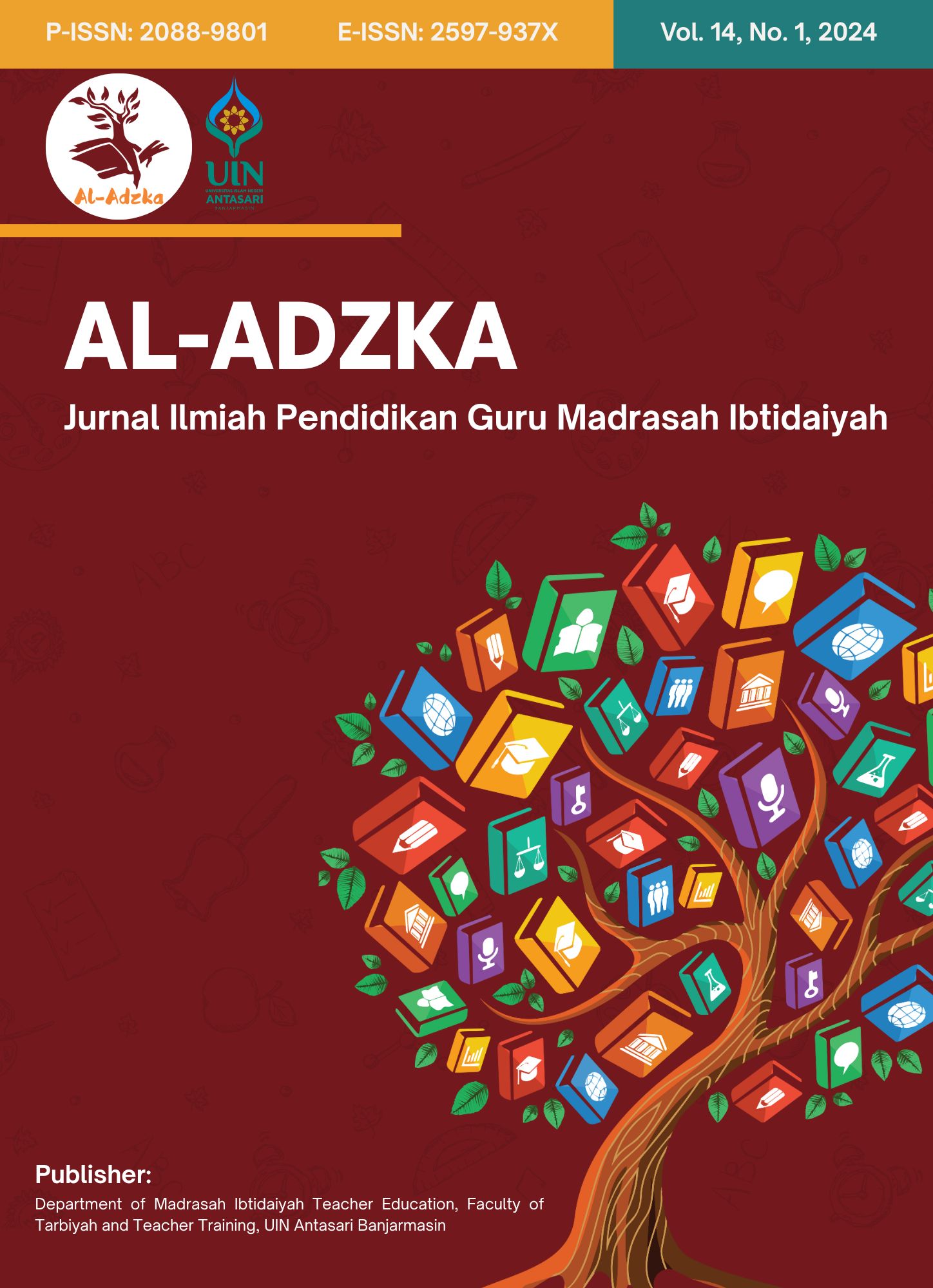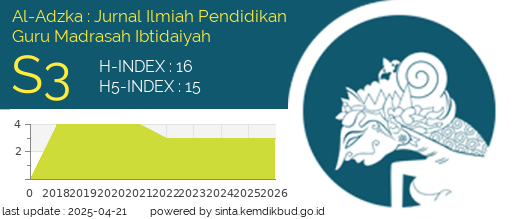Developing Ideological Intelligence in Schools: Appreciation and Practice of Pancasila Values through Extracurricular Activities
DOI:
https://doi.org/10.18592/aladzkapgmi.v14i1.12265Keywords:
Extracurriculars; Ideological Intelligence; Pancasila ValuesAbstract
The article's purpose is to describe the idea of actualizing Pancasila values through extracurricular activities to build students' ideological intelligence in school. Data was collected through literature studies using theories relevant to the research theme. In Indonesia, shared values are expressed in Pancasila, which can unite society amidst differences in culture, race, language, religion and political beliefs. Pancasila, as a state ideology, provides orientation, insight, and normative guidelines in all areas of life. Ideological intelligence is needed to appreciate, internalize and apply Pancasila values in life. Ideological intelligence through education is realized in Pancasila, and citizenship education (PPKn) is realized in schools. The revitalization of PPKn as ideological education can be realized in extracurricular activities under the coordination of PPKn teachers, with the advantages of: 1) It provides an ideological learning experience that is fun and easy to digest for students. 2) I am avoiding elements of indoctrination in learning. 3) The entire school community is involved in an open place because ideological intelligence cannot be developed through rhetoric and symbols.References
Agiyanto, U. (2018). Law Enforcement in Indonesia: Exploration of the Concept of Justice in Islamic Dimension with Pancasila Ideology. AL-HAYAT: Journal of Islamic Education, 2(2), 246. https://doi.org/10.35723/ajie.v2i2.37
Alim, S. (2019). Islam , Multikulturalisme , dan Pancasila. Jurnal Kajian Dakwah Dan Kemasyarakatan, 23(2), 85–99. https://doi.org/10.15408/dakwah.v23i2.13938
Arifin, A. (2023). Profile of Pancasila Students Through Mathematics Education. Russian Law Journal, 11(3), 5–6. https://doi.org/10.52783/rlj.v11i3.1957
Bu, Y. (2021). Literature Review, Theoretical Framework and Research Method. In Y. Bu (Ed.), Narrative Inquiry into Reciprocal Learning Between Canada-China Sister Schools (pp. 87–108). Springer International Publishing. https://doi.org/10.1007/978-3-030-61085-2_4
Budimansyah, Dasim (Ed). 2016. Teori sosial dan kewarganegaraan. Bandung: Widia Aksara Press.
Chotimah, U., Aisyah, N., & Meryansumayeka, M. (2020). Memperkuat Karakter Peserta Didik melalui Implementasi Model Pembelajaran Berbasis HOTS pada Pembelajaran PPKn. Bhineka Tunggal Ika: Kajian Teori Dan Praktik Pendidikan PKn, 7(1), 55–67. https://doi.org/10.36706/jbti.v7i1.11414
Dewi, N. N., & Najicha, F. U. (2022). Pentingnya Menjaga Nilai Pancasila dalam Kehidupan Bermasyarakat bagi Generasi Z. Antropocene : Jurnal Penelitian Ilmu Humaniora, 2(1), 1–6. https://doi.org/10.56393/antropocene.v2i1.896
Eddison, Hambali, H. (2020). Penguatan Nilai-Nilai Pancasila Guna Membangun Kecerdasan Berideologi Pada Guru Ppkn SMA/SMK Kota Dumai. Jurnal Pendidikan Kewarganegaraan Undiksha, 9(3), 993–1005. https://doi.org/10.23887/jpku.v9i3.40431
Eddison, A., Hambali, H. (2023). Pelatihan Pembuatan Media Pembelajaran Pancasila Pada Guru MGMP PPKn SMA / SMK. JCES, 6(1), 2–10. https://doi.org/10.31764/jces.v6i1.10556
Fitriani, S. (2020). Keberagaman dan Toleransi Antar Umat Beragama. Analisis: Jurnal Studi Keislaman, 20(2), 179–192. https://doi.org/10.24042/ajsk.v20i2.5489
García, M. G. (2022). Systematic Literature Review Applied to a Research Project. In M.-V. Carrillo-Durán & M. Pérez Pulido (Eds.), Advances in Knowledge Acquisition, Transfer, and Management (pp. 45–60). IGI Global. https://doi.org/10.4018/978-1-6684-4523-5.ch003
Hariyanti, Irayanti, I., Retnasari, L., Istianah, A., Cahya, G., & Sasmita, S. K. (2023). Existence of Local Wisdom Based on Pancasila Values Amidst the Dynamics of Global Issues. Jurnal Etika Demokrasi, 8(2), 223–233. https://doi.org/10.26618/jed.v
Herdiansah, A. G. (2016). Peran Organisasi Masyarakat (Ormas) Dan Lembaga Swadaya Masyarakat (Lsm) Dalam Menopang Pembangunan Di Indonesia. Sosioglobal : Jurnal Pemikiran Dan Penelitian Sosiologi, 1(1), 49. https://doi.org/10.24198/jsg.v1i1.11185
Hilyatin, D. L., Riyadi, S., & Basit, A. (2021). Transformation of Islamic Values in the Pancasila Economic System. Turkish Online Journal of Qualitative Inquiry, 12(3), 2580–2595. http://e-resources.perpusnas.go.id:2048/login?url=https://search.ebscohost.com/login.aspx?direct=true&db=ehh&AN=160413649&site=eds-live%0Afiles/469/Hilyatin et al. - 2021 - Transformation of Islamic Values in the Pancasila .pdf
Idrissi, H. (2020). Exploring global citizenship learning and ecological Behaviour change through extracurricular activities. International Journal of Lifelong Education, 39(3), 272–290. https://doi.org/10.1080/02601370.2020.1778805
Irawati, D., Iqbal, A. M., Hasanah, A., & Arifin, B. S. (2022). Profil Pelajar Pancasila Sebagai Upaya Mewujudkan Karakter Bangsa. Edumaspul: Jurnal Pendidikan, 6(1), 1224–1238. https://doi.org/10.33487/edumaspul.v6i1.3622
Irayanti, I., Istianah, A., & Sapriya, S. (2023). Harmony in Citizenship Education in Building Peaceful Schools for Students’ Social Welfare. Al-Adzka: Jurnal Ilmiah Pendidikan Guru Madrasah Ibtidaiyah, 13(2), 89–98. https://doi.org/10.18952/aladzkapgmi.v13i2.10908
Kardiman, Y., Muchtar, S. Al, Abdulkarim, A., & Sapriya. (2020). Pancasila and Civilized Society. 418(Acec 2019), 380–385. https://doi.org/10.2991/assehr.k.200320.072
Khoiri, M., Tiara, M., Ahmad, Z. Bin, Trisno, A., & Rahman, Abd. (2017). Puspagram Pendidikan Kewarganegaraan: Di Berbagai Negara. http://repository.unp.ac.id/15809/1/Pusparagam OK.pdf
Latif, Y. (2018). Identitas Keindonesiaan dan Aktualisasi Pancasila bagi Generasi Milenial di Era Digital. Jurnal Kajian Lemhannas RI, 33, 5–19. https://jurnal.lemhannas.go.id/index.php/jkl/article/view/112
Muchtar, S. Al. (2020). Pendekatan pendidikan etika politik pancasila dalam pendidikan pancasila dan kewarganegaraan di indonesia. Jurnal Majelis, 5, 33. https://doi.org/10.31764/jmm.v7i5.16851
Muchtar, S. Al, & Iswandi, D. (2018). The Paradigm of Value Ideology of Pancasila as the Basis of Citizenship Education in the Global Perspective. 251(Acec), 492–496. https://doi.org/10.2991/acec-18.2018.112
Muhammad Anas, M. (2019). Internalisasi Nilai Multikultural dalam Mengembangkan Sikap Toleransi (Studi di Pesantren Mahasiswa Universitas Islam Malang). Nazhruna : Jurnal Pendidikan Islam, 2(1), 164–189. https://doi.org/10.31538/nzh.v2i1.179
Muqsith, M. A., Muzykant, V. L., Tayibnapis, R. G., & Pratomo, R. R. (2022). Revolutionizing Pancasila as the ideology of Indonesians. RUDN Journal of Sociology, 22(4), 860–871. https://doi.org/10.22363/2313-2272-2022-22-4-860-871
Nurasiah, I., Marini, A., Nafiah, M., & Rachmawati, N. (2022). Nilai Kearifan Lokal: Projek Paradigma Baru Program Sekolah Penggerak untuk Mewujudkan Profil Pelajar Pancasila. Jurnal Basicedu, 6(3), 3639–3648. https://doi.org/10.31004/basicedu.v6i3.2727
Nurhidayah, D., Aisyah, E. S., & Nurjannah, J. (2020). PKn dalam Kurikulum 2013. JPPHK (Jurnal Pendidikan Politik, Hukum Dan Kewarganegaraan), 10(1), 1–13.
Peraturan Menteri Pendidikan dan Kebudayaan Republik Indonesia Nomor 22. Tahun 2016 Tentang Standar Proses Pendidikan Dasar Dan Menengah. https://repositori.kemdikbud.go.id/4790/1/Permendikbud_Tahun2016_Nomor022.pdf
Pitaloka, D. L., Dimyati, D., & Purwanta, E. (2021). Peran Guru dalam Menanamkan Nilai Toleransi pada Anak Usia Dini di Indonesia. Jurnal Obsesi : Jurnal Pendidikan Anak Usia Dini, 5(2), 1696–1705. https://doi.org/10.31004/obsesi.v5i2.972
Satria, R., Adiprima, P., Wulan, K. S., & Harjatanaya, T. Y. (2022). Projek Penguatan Profil Pelajar Pancasila. Badan Standar, Kurikulum dan Asesmen Pendidikan Kementerian Pendidikan, Kebudayaan, Riset, Teknologi Republik Indonesia.
Shofa, A. M. A. (2016). Memaknai kembali multikulturalisme Indonesia dalam bingkai pancasila. JPK (Jurnal Pancasila Dan Kewarganegaraan), 1(1), 34–41. http://journal.umpo.ac.id/index.php/JPK/article/view/302
Silitonga, T. B. (2020). Tantangan globalisasi, peran negara, dan implikasinya terhadap aktualisasi nilai-nilai ideologi negara. Jurnal Civics: Media Kajian Kewarganegaraan, 17(1), 15–28. https://doi.org/10.21831/jc.v17i1.29271
Siregar, C. (2014). Pancasila, Keadilan Sosial, dan Persatuan Indonesia. Humaniora, 5(1), 107. https://doi.org/10.21512/humaniora.v5i1.2988
Subagyo, A. (2020). Implementasi Pancasila Dalam Menangkal Intoleransi, Radikalisme Dan Terorisme. Jurnal Rontal Keilmuan PKn, 6(1), 10–24.
Sulistiawati, A., Khawani, A., Yulianti, J., Kamaludin, A., & Munip, A. (2023). Implementasi profil pelajar Pancasila melalui proyek bermuatan kearifan lokal di SD Negeri Trayu. Jurnal Fundadikdas (Fundamental Pendidikan Dasar), 5(3), 195–208. https://doi.org/10.12928/fundadikdas.v5i3.7082
Susilawati, E., Sarifuddin, S., Data, P., & Pendidikan, K. (2021). Internalization of Pancasila Values in Learning through Implementation of Pancasila Student Profile with “ Merdeka Mengajar ” Platform. Jurnal TEKNODIK, 25(2), 155–168. https://doi.org/10.32550/teknodik.v25i2.897
Triyono, M. S., Suhaemi, M., Mufatiroh, S., & Istiqomah, N. (2022). Merajut Asa dan Rasa Untuk Generasi Pancasila Melalui Budaya Gotong Royong di Desa Banyu Asih Bogor. Jurnal Citizenship Virtues, 2(1), 301–310. https://doi.org/10.37640/jcv.v2i1.1366
Undang-Undang No.20 Tahun 2003 Tentang Sistem Pendidikan Nasional.
Wang, Y. Z. (2014). Explore the ideological and political theory courses extracurricular teaching methods. Advanced Materials Research, 1030–1032, 2708–2711. https://doi.org/10.4028/www.scientific.net/AMR.1030-1032.2708
Wickrama, T., Merten, M. J., & Perera, N. T. (2023). Writing a Literature Review. In C. A. Saliya (Ed.), Advances in Knowledge Acquisition, Transfer, and Management (pp. 117–133). IGI Global. https://doi.org/10.4018/978-1-6684-6859-3.ch008
Widodo, B., Al Muchtar, S., & AR, E. D. (2022). Pancasila Literacy to Build Insightful Citizenship Civilization Environment in the Industrial Age 4.0. Proceedings of the Annual Civic Education Conference (ACEC 2021), 636(Acec 2021), 46–52. https://doi.org/10.2991/assehr.k.220108.009
Winataputra, U. S. & Sri Setiono. (2017). Pedoman Umum Penggalian dan Perwujudan Nilai Akhlak Mulia Bagian Penguatan Pendidikan Karakter (PPK). Kementrian Pendidikan Dan Kebudayaan Direktorat Jenderal Pendidikan Dasar Dan Menengah.
Downloads
Published
How to Cite
Issue
Section
License
Copyright (c) 2024 Hariyanti Haryanti, Gigieh Cahya Permady, Irma Irayanto, Saepudin Kartasasmita, Anif Istianah

This work is licensed under a Creative Commons Attribution 4.0 International License.
Authors who publish with this journal agree to the following terms:
- Authors retain copyright and grant the journal right of first publication with the work simultaneously licensed under a Creative Commons Attribution 4.0 International that allows others to share the work with an acknowledgement of the work's authorship and initial publication in this journal.
- Authors are able to enter into separate, additional contractual arrangements for the non-exclusive distribution of the journal's published version of the work (e.g., post it to an institutional repository or publish it in a book), with an acknowledgement of its initial publication in this journal.
- Authors are permitted and encouraged to post their work online (e.g., in institutional repositories or on their website) prior to and during the submission process, as it can lead to productive exchanges, as well as earlier and greater citation of published work.












